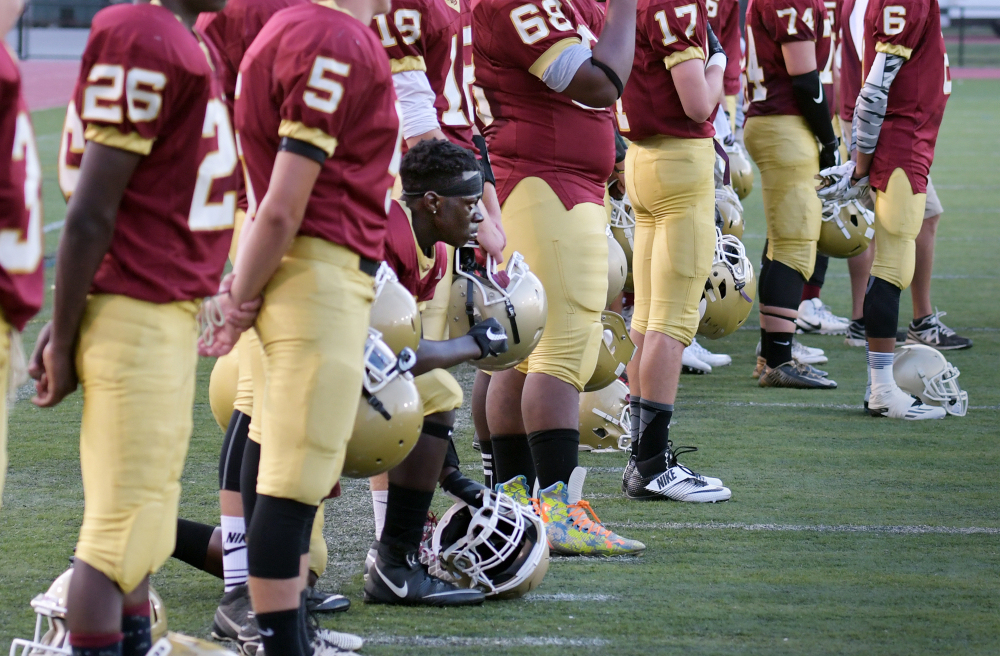Colin Kaepernick’s protest against social injustice is being heard loud and clear by young athletes across the country and a host of high school football players have emulated the San Francisco quarterback in recent weeks by kneeling during the national anthem before their own games.
That’s where the issue gets complicated.
In football-crazy states such as New Jersey, Alabama and Massachusetts, some players have faced suspension and others have reported harassment or even threats over their stance.
“We are not public institutions and free speech in all of its demonstrations, including protests, is not a guaranteed right,” wrote Mary Boyle, superintendent of the Catholic Schools Diocese of Camden, New Jersey. She told her administrators and coaches that players who failed to “demonstrate appropriate respect” by choosing not to stand for the national anthem could face game and team suspensions.
Michael Walsh, diocese spokesman, called the letter a “precautionary notice in light of what had been occurring at the professional level.” He said diocesan schools have always had a policy “to show respect and honor for God and country.”
In Maine, some school officials are reminding student athletes of policies and guidelines, but it doesn’t appear that anthem protests are being considered.
Kaepernick has faced heavy criticism, but has continued to suit up each week – without the support of the 49ers and NFL, but also without the threat of punishment. High school administrators and coaches are left to juggle the right of free speech with keeping order among their young charges.
David L. Hudson Jr., author of “Let the Students Speak: A History of the Fight for Freedom of Expression in American Schools,” said silent or passive protests like kneeling are not disruptive and, therefore, allowed under court rulings dating back decades.
“The highest court in the land ruled long ago, and it’s been upheld time after time, that students do not leave their free speech rights at the schoolhouse gate,” said Bob Farrace, director of public affairs for the National Association of Secondary School Principals. He noted that the Supreme Court ruled in 1969 that public school students in Iowa could wear black armbands to silently protest the Vietnam War. But they wouldn’t necessarily be allowed to picket in a school hallway.
Michael Walker, director of the Office of Black Male Student Achievement in the Minneapolis Public Schools, said his class had discussed the NFL protest, using it as a starting point to research the verses of the national anthem. He didn’t know in advance that six or seven local football players planned to take a knee during the anthem last Friday night. He retweeted a picture of the protest and said he got no negative feedback.
“We want to make sure that our students have the space and safety to share their thoughts, their beliefs, their perspectives on different things that are happening within their community, within our society and so this is no different,” he said. “We let them make decisions on their own with the information that they have. But what we also discussed with them … consequences for your actions. You have to understand that there is always two sides. There will be some people who will support you. There will be some people who will not support you in your stance and how are you ready to handle the repercussions of that?”
Junior quarterback Michael Oppong at Doherty Memorial High School in Worcester, Massachusetts, said on Twitter that he was told he would be suspended for one game after announcing he would kneel during the anthem before a recent game. It was a decision district officials quickly reversed .
Copy the Story LinkSend questions/comments to the editors.



Success. Please wait for the page to reload. If the page does not reload within 5 seconds, please refresh the page.
Enter your email and password to access comments.
Hi, to comment on stories you must . This profile is in addition to your subscription and website login.
Already have a commenting profile? .
Invalid username/password.
Please check your email to confirm and complete your registration.
Only subscribers are eligible to post comments. Please subscribe or login first for digital access. Here’s why.
Use the form below to reset your password. When you've submitted your account email, we will send an email with a reset code.